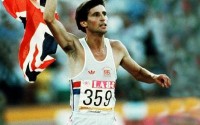Are Olympic champions made or born?
- Date
- 11 Mar 2012
- Start time
- 2:30 PM
- Venue
- Tempest Anderson Hall
- Speaker
- Prof Andy Smith

Are Olympic Champions made or born?
Professor Andy Smith, MBE, Sport Science Department, University of York St John
Family lecture for National Science & Engineering Week (joint event with York Museums Trust)
If they trained hard and smart enough could anyone become an Olympic Champion? Or to stand on the podium do you have to be born with the right genetics and personality traits? Is sporting excellence determined by how much effort you put in or by the talent (or lack of it) you are born with? This lecture will attempt to answer this question by i) explaining why we should care what the answer is; ii) looking at the historical evidence; iii) using examples from a wide range of sports and iv) explaining some of the latest findings from Sports Science. This interactive and fun lecture will also attempt to predict how the Olympians of the future will prepare for competition.
Report
by Tom Hartle
A riveting lecture, where we were lucky enough to be joined by two paralympic swimmers; Claire Cashmore, and David Ellis. The topic: how the age old debate over nature vs. nurture relates to athletic success. Smith himself is in a unique position to examine this question, being married to one of identical twin Olympic runners.
A definitive answer would be profound, affecting whether emphasis is put on talent recognition programmes, or on training. On the nature side of the argument are muscle fibres, which are either fast-twitch or slow, and are suited for different sports. These differences are largely genetically determined, as is the VO2 max (the oxygen level an athlete delivers to the muscles). On the other hand both these factors can be improved through training, and genetics has less impact on skill-based sports like archery. Here Ericssons rule, that proficiency requires 10,000 hours of practice, may be more crucial.
Smith concluded that, although genes are important, training and psychology are what allow individual champions to succeed. A varied question and answer session completed the afternoon, with the message that, with hard work, anything is possible.
Sponsored by York Museums Trust